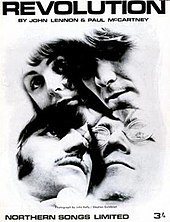| "Revolution" | ||||
|---|---|---|---|---|
 UK single B-side label | ||||
| Single by the Beatles | ||||
| A-side | "Hey Jude" | |||
| Released | 26 August 1968 | |||
| Recorded | 9–13 July 1968 | |||
| Studio | EMI (London) | |||
| Genre | ||||
| Length | 3:21 | |||
| Label | Apple | |||
| Songwriter(s) | Lennon–McCartney | |||
| Producer(s) | George Martin | |||
| The Beatles singles chronology | ||||
| ||||
| Promotional film | ||||
| "Revolution" on YouTube | ||||
| "Revolution 1" | |
|---|---|
 Northern Songs sheet music cover | |
| Song by the Beatles | |
| from the album The Beatles | |
| Released | 22 November 1968 |
| Recorded | 30–31 May and 4 & 21 June 1968 |
| Studio | EMI (London) |
| Genre | |
| Length | 4:17 |
| Label | Apple |
| Songwriter(s) | Lennon–McCartney |
| Producer(s) | George Martin |
"Revolution" is a song by the English rock band the Beatles, written by John Lennon and credited to the Lennon–McCartney partnership. Three versions of the song were recorded and released in 1968, all during sessions for the Beatles' self-titled double album, also known as the "White Album": a slow, bluesy arrangement ("Revolution 1") included on the album; an abstract sound collage (titled "Revolution 9") that originated as the latter part of "Revolution 1" and appears on the same album; and the faster, hard rock version similar to "Revolution 1", released as the B-side of "Hey Jude". Although the single version was issued first, it was recorded several weeks after "Revolution 1", intended for release as a single. A music video for the song was shot using the backing track from the single version, their appearances reflecting the song's atmosphere, along with live-sung lyrics that more closely resemble the album version.
Inspired by political protests in early 1968, Lennon's lyrics expressed sympathy with the need for social change but doubt in regard to the violent tactics espoused by some members of the New Left. Despite his bandmates' reservations, he persevered with the song and insisted it be included on their next single. When released in August, the song was viewed by the political left as a betrayal of their cause and a sign that the Beatles were out of step with radical elements of the counterculture. The release of "Revolution 1" in November indicated Lennon's uncertainty about destructive change, with the phrase "count me out" recorded instead as "count me out – in". Lennon was stung by the criticism he received from the New Left and subsequently espoused the need for Marxist revolution, particularly with his 1971 single "Power to the People". However, in one of the final interviews he gave before his death in 1980, he reaffirmed the pacifist sentiments expressed in "Revolution".
"Revolution" reached number 12 on the Billboard Hot 100 in the US and topped singles charts in Australia and New Zealand. "Revolution" has received praise from music critics, particularly for the intensity of the performance and the heavily distorted guitar sound. In 1987, the song became the first Beatles recording to be licensed for a television commercial, which prompted a lawsuit from the surviving members of the group. The song has been covered by numerous artists, including Thompson Twins, who performed it at Live Aid in July 1985, and Stone Temple Pilots.
- ^ Du Noyer 1996, p. 59.
- ^ Doggett 2007, p. 176.
- ^ Erlewine, Stephen Thomas. "The Beatles 'Hey Jude'". AllMusic. Retrieved 1 July 2021.
- ^ a b Marsh 1989, p. 424
- ^ Lifton, Dave (26 August 2015). "Revisiting the Beatles' First Apple Release, 'Revolution'". Ultimate Classic Rock. Retrieved 9 April 2020.
- ^ Greene 2016, p. 46.